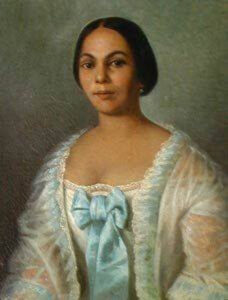
Marie Coincoin
*The birth of Marie Coincoin is celebrated on this date in 1742. She was a Black nurse, planter, slave owner, and businesswoman at the colonial Louisiana outpost of Natchitoches Parish.
A Louisianan Creole, Marie Theresa Coincoin was born into the slavery of Louis Antoine Juchereau de St. Denis. Her parents were François and Marie Françoise; she was the fourth of eleven children. Coincoin and her sister Marie Louise were trained in pharmacology and nursing as children. When still young, Coincoin had five children. Some records show that Coincoin's first five children were of full African, and others suggest they were partially Native American, fathered by Chatta.
About 1765, her mistress granted Coincoin to live with the young French merchant Claude Thomas Pierre Métoyer, who freed her. Together, they moved from the post to outlying lands until 1788. As his mixed-race children matured and married, Métoyer freed the eldest five of the ten children whom he had held in slavery.
As a free woman, Coincoin exploited a variety of economic enterprises. She manufactured medicine, planted tobacco, and trapped wild bears and turkeys for the local market. She also shipped peltry, oil, and indigo that she sourced from the bear skins to New Orleans along with her cured tobacco. She became a landowner and a taxpayer. As a pious Catholic, she volunteered labor for the upkeep of the parish church. Like many other freed slaves in colonial Louisiana, she acquired slaves to protect them from others in the parish purchasing them. Most were related to Coincoin or close friends; she labored alongside them until her health began to fail.
The liberal land-grant policies of the Spanish Crown provided a stake for her first farmstead on the Grand Coast of Red River. That small tract of 67 acres, alluvial river-bottom land adjacent to Metoyer's plantation, was conceded by the local commandant in January 1787 and patented by the Crown in May 1794. Coincoin applied for a significantly larger concession of piney woods on Old River to the west of her farm, where she established a cattle range and hired a Spaniard to operate it. In 1807, she bought a third tract adjacent to her homestead. She provided a stake for a younger son who had come of age after the Louisiana Purchase, too late to benefit from the more liberal land policies of the Spanish regime.
Coincoin founded Cane River's Melrose Plantation. However, this land was granted to her son, Louis Métoyer, who built most of the surviving plantation buildings. Coincoin lived frugally and served others, investing all her income into purchasing freedom for the children from the slave marriage of her youth. By her death, she had manumitted three children and three grandchildren.
Coincoin died in 1816, and her grave is no longer marked. Tradition holds that Coincoin's African-born parents retained much of their culture, and some evidence supports that. One Africanist historian proposed in the 1970s that the African Coincoin (spelled variously in transliterations by French and Spanish scribes) was the name used for "second-born daughters" among those Ewe of coastal Togo who speak the Glidzi dialect.